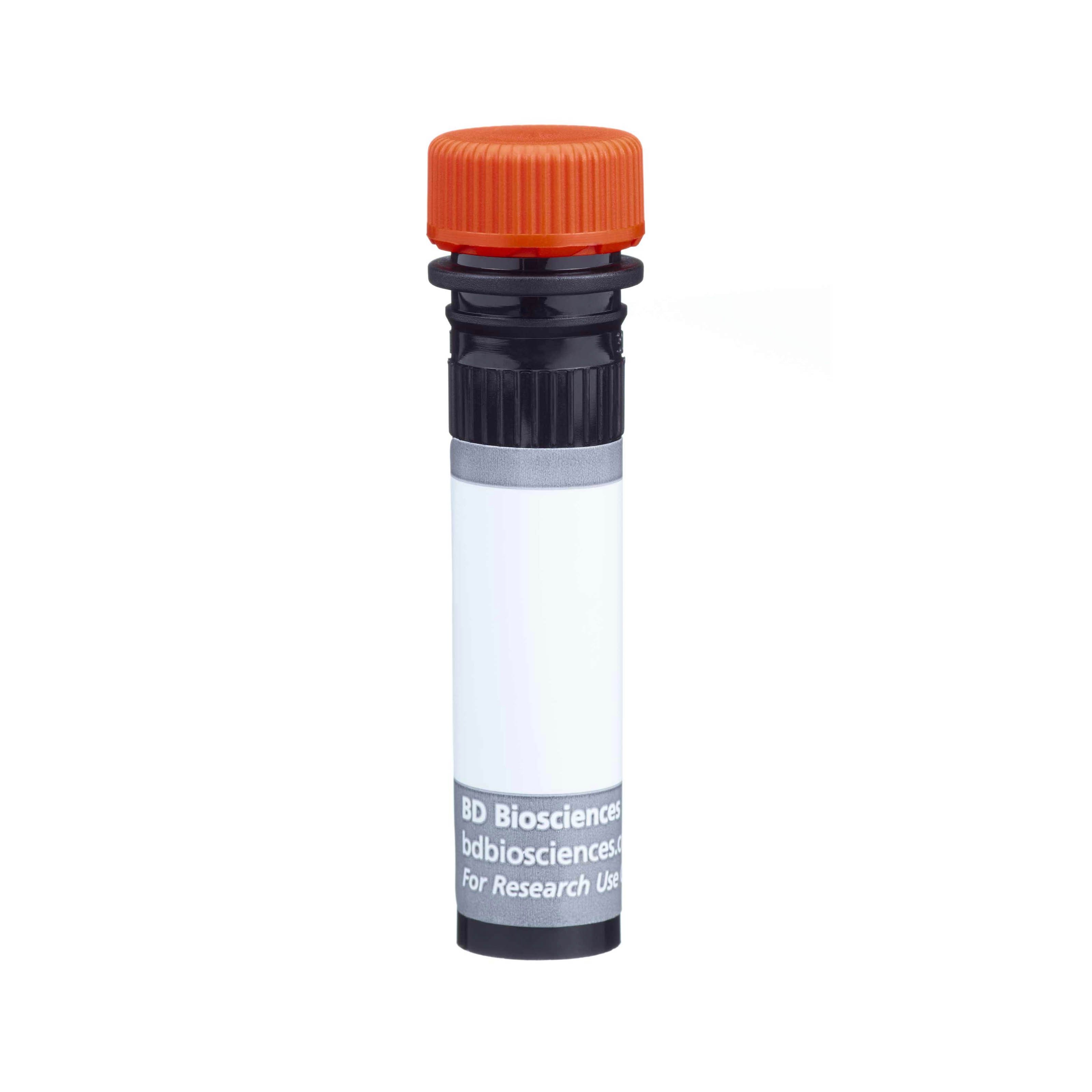Old Browser
This page has been recently translated and is available in French now.
Looks like you're visiting us from {countryName}.
Would you like to stay on the current country site or be switched to your country?


Regulatory Status Legend
Any use of products other than the permitted use without the express written authorization of Becton, Dickinson and Company is strictly prohibited.
Preparation And Storage
Recommended Assay Procedures
For optimal and reproducible results, BD Horizon Brilliant Stain Buffer should be used anytime two or more BD Horizon Brilliant dyes (including BD OptiBuild Brilliant reagents) are used in the same experiment. Fluorescent dye interactions may cause staining artifacts which may affect data interpretation. The BD Horizon Brilliant Stain Buffer was designed to minimize these interactions. More information can be found in the Technical Data Sheet of the BD Horizon Brilliant Stain Buffer (Cat. No. 563794).
Product Notices
- This antibody was developed for use in flow cytometry.
- The production process underwent stringent testing and validation to assure that it generates a high-quality conjugate with consistent performance and specific binding activity. However, verification testing has not been performed on all conjugate lots.
- Researchers should determine the optimal concentration of this reagent for their individual applications.
- An isotype control should be used at the same concentration as the antibody of interest.
- Caution: Sodium azide yields highly toxic hydrazoic acid under acidic conditions. Dilute azide compounds in running water before discarding to avoid accumulation of potentially explosive deposits in plumbing.
- For fluorochrome spectra and suitable instrument settings, please refer to our Multicolor Flow Cytometry web page at www.bdbiosciences.com/colors.
- Please refer to www.bdbiosciences.com/us/s/resources for technical protocols.
- BD Horizon Brilliant Stain Buffer is covered by one or more of the following US patents: 8,110,673; 8,158,444; 8,575,303; 8,354,239.
- BD Horizon Brilliant Ultraviolet 737 is covered by one or more of the following US patents: 8,110,673; 8,158,444; 8,227,187; 8,575,303; 8,354,239.
Companion Products






The 2ST8.5H7 monoclonal antibody specifically recognizes an epitope formed by the combination of CD8 alpha and beta chains. The majority of peripheral blood CD8+ T lymphocytes expresses a CD8αβ heterodimer (32, 30 kilodaltons (kDa)), while CD8+CD16+ natural killer (NK) cells and CD8+ TCR γδ+ T lymphocytes express CD8αα homodimers. The 2ST8.5H7 antibody can therefore be used to selectively bind to CD8+ T cells while excluding CD8+ NK cells. CD8 binds to class I major histocompatibility (MHC) molecules, resulting in increased adhesion between the CD8+ T lymphocytes and target cells. Binding of CD8 to class I MHC molecules enhances the activation of resting T lymphocytes. CD8 is coupled to a protein tyrosine kinase, p56lck. The CD8:p56lck complex can play a role in T-lymphocyte activation through mediation of the interactions between CD8 and the CD3/TCR complex. The CD8β antigen is present on the human suppressor/cytotoxic T-lymphocyte subset. The CD8 antigen is expressed on 19% to 48% of normal peripheral blood lymphocytes and 60% to 85% of normal thymocytes. The 2ST8.5H7 antibody crossreacts with lymphocytes of some nonhuman primate species.
The antibody was conjugated to BD Horizon™ BUV737 which is part of the BD Horizon Brilliant™ Ultraviolet family of dyes. This dye is a tandem fluorochrome of BD Horizon BUV395 with an Ex Max of 348-nm and an acceptor dye with an Em Max at 737-nm. BD Horizon Brilliant BUV737 can be excited by the ultraviolet laser (355 nm) and detected with a 740/35 filter. Due to the excitation of the acceptor dye by other laser lines, there may be significant spillover into channels detecting Alexa Fluor® 700-like dyes (eg, 712/20-nm filter).
Due to spectral differences between labeled cells and beads, using BD™ CompBeads can result in incorrect spillover values when used with BD Horizon BUV737 reagents. Therefore, the use of BD CompBeads or BD CompBeads Plus to determine spillover values for these reagents is not recommended. Different BUV737 reagents (eg, CD4 vs. CD45) can have slightly different fluorescence spillover therefore, it may also be necessary to use clone specific compensation controls when using these reagents.

Development References (6)
-
Hambor JE, Weber MC, Tykocinski ML, Kaplan DR. Regulation of allogeneic responses by expression of CD8 alpha chain on stimulator cells.. Int Immunol. 1990; 2(9):879-83. (Clone-specific). View Reference
-
Hori T, Cupp J, Wrighton N, Lee F, Spits H. Identification of a novel human thymocyte subset with a phenotype of CD3- CD4+ CD8 alpha + beta-1. Possible progeny of the CD3- CD4- CD8- subset.. J Immunol. 1991; 146(12):4078-84. (Clone-specific). View Reference
-
Ledbetter JA, Evans RL, Lipinski M, Cunningham-Rundles C, Good RA, Herzenberg LA. Evolutionary conservation of surface molecules that distinguish T lymphocyte helper/inducer and cytotoxic/suppressor subpopulations in mouse and man. J Exp Med. 1981; 153(2):310-323. (Biology). View Reference
-
Moebius U. Cluster report: CD8. In: Knapp W. W. Knapp .. et al., ed. Leucocyte typing IV : white cell differentiation antigens. Oxford New York: Oxford University Press; 1989:342-343.
-
Shiue L, Gorman SD, Parnes JR. A second chain of human CD8 is expressed on peripheral blood lymphocytes.. J Exp Med. 1988; 168(6):1993-2005. (Clone-specific). View Reference
-
Terry LA, DiSanto JP, Small TN, Flomenberg N. Differential expression of the CD8 and Lyt-3 antigens on a subset of human T-cell receptor γ/δ-bearing lymphocytes. In: Knapp W. W. Knapp .. et al., ed. Leucocyte typing IV : white cell differentiation antigens. Oxford New York: Oxford University Press; 1989:345-346.
Please refer to Support Documents for Quality Certificates
Global - Refer to manufacturer's instructions for use and related User Manuals and Technical data sheets before using this products as described
Comparisons, where applicable, are made against older BD Technology, manual methods or are general performance claims. Comparisons are not made against non-BD technologies, unless otherwise noted.
For Research Use Only. Not for use in diagnostic or therapeutic procedures.
Report a Site Issue
This form is intended to help us improve our website experience. For other support, please visit our Contact Us page.